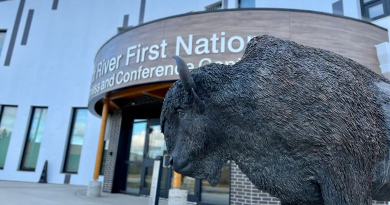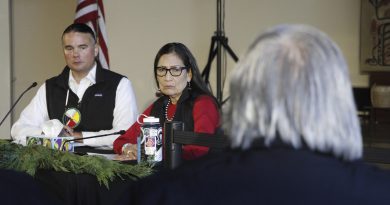Mental health service backlog in Canada’s Northwest Territories
 Long wait times, increased caseload after summer TRC event
Long wait times, increased caseload after summer TRC event
People in the Mackenzie Delta region of Canada’s Northwest Territories are growing frustrated with a backlog for counselling in the region.
Long wait times and an increased caseload are contributing to the problem, especially after hundreds travelled to Inuvik, Northwest Territories, in June for a Truth and Reconciliation Commission national event.
Those who made the journey were told they would receive support from Health Canada when the event was over.
But as CBC News found out, that support is not always available.
“What we have to recognize is that this has been a war zone,” said TRC Commissioner Marie Wilson.
She said the past 150 years have killed and damaged spirits in the aboriginal community. She said it’s going to take extraordinary resources to set that right.
“I think we have to revise our expectations around that if we think that this is going to be a five-year happy project and then everyone’s going to be okay. It could never be that,” said Wilson. “How could it ever be that when we are hearing stories and details of some of the most devastating things that Canada has ever done to itself and its citizens?” she asked.
Long waits for services
The Healing Drum Society in Yellowknife is dealing with some of that trauma.
Joe Pintarics, the society’s acting executive director, said Health Canada is doing its best to provide counselling services.
But Pintarics said he’s concerned that an increased caseload and a decrease of community resources spells trouble.
“The community itself is not well. It needs healing. And that kind of stuff needs to be done at the community level. And so that’s where I hope Health Canada finds a way to respond as well, because that would be an important piece for them to add to what they’re doing,” said Pintarics.
The Inuvialuit Regional Corporation confirms there has been a noticeable increase of cases in the Mackenzie Delta since the TRC event last June. The corporation said people can wait months to receive professional services from Health Canada.
The member of the legislative assembly for Inuvik Boot Lake, Alfred Moses, has also noticed the backlog.
“Something needs to be done to address this issue in a better and more efficient way so that people who are needing those services do get them,” he said.
The federal Health Minister, Leona Aglukkaq, declined CBC’s request for an interview.
In a written statement, Health Canada said it is aware of a growing need for mental health services. The department said it is working with the Inuvialuit Regional Corporation to identify and address mental health needs.



